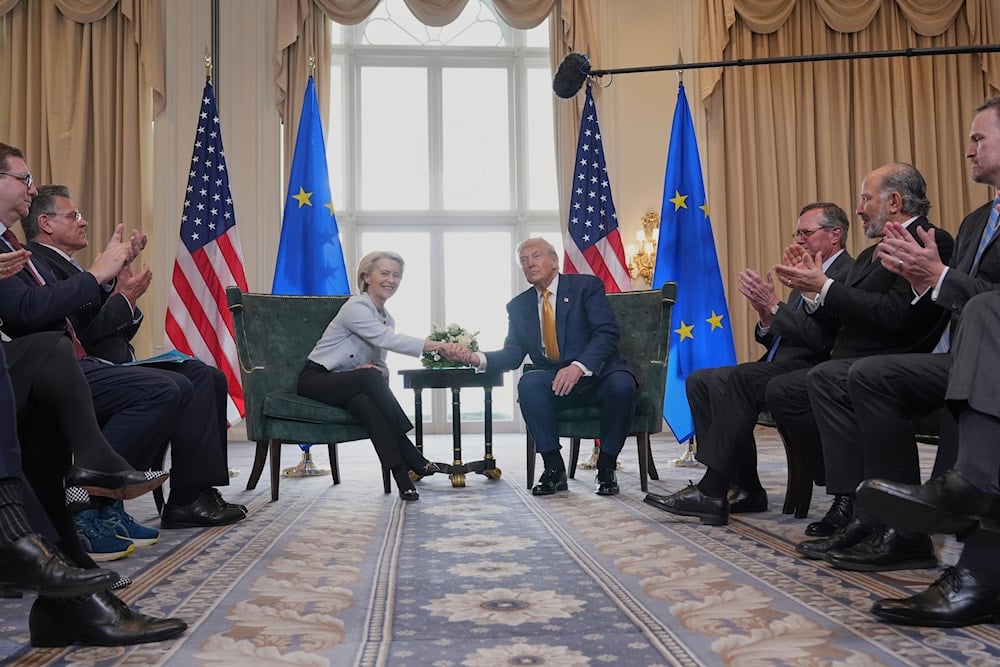Europe slams Trump trade deal as humiliating concession
As Trump celebrates a major geopolitical win, European opposition parties accuse Brussels of economic surrender and undermining EU sovereignty.
-

US President Donald Trump and European Commission President Ursula von der Leyen shake hands after reaching a trade deal at the Trump Turnberry golf course in Turnberry, Scotland, Sunday, July 27, 2025. (AP)
A newly sealed trade agreement between the United States and the European Union has triggered a wave of political outrage across Europe, even as senior US officials celebrate it as a monumental triumph for US President Donald Trump. Critics across the continent are denouncing the accord as a humiliating surrender of European economic sovereignty.
The deal, finalized Sunday during high-level talks between Trump and European Commission President Ursula von der Leyen, imposes a sweeping 15% tariff on the majority of EU exports to the US. In return, the EU committed to injecting $600 billion into the US economy and importing $750 billion worth of American energy over the next three years.
There are no reciprocal obligations from Washington, no matching tariff reductions or economic investments. This lopsided arrangement has ignited a political firestorm across Europe, where many see it as an unprecedented geopolitical capitulation.
White House Advisor Sebastian Gorka was blunt in his characterization: “Even for somebody like me who has known the president for a decade now, it is hard to believe that the whole European Union bent at the knee of America First and said: ‘You got us, President Trump.’”
Calling it a “geopolitical earthquake,” Gorka declared that Trump had reshaped the global order through sheer force of will. “If you don’t understand that President Trump is engineering tectonic shifts in geopolitics… You are just an imbecile,” he said in a Newsmax interview.
European leaders slam deal as ‘humiliating’, ‘fiasco’
European leaders and opposition figures responded with fury. Hungarian Prime Minister Viktor Orban ridiculed the negotiations, saying, “Donald Trump ate Ursula von der Leyen for breakfast.” French Prime Minister Francois Bayrou called the agreement “a submission,” while far-right National Rally leader Marine Le Pen described it as “a political, economic, and moral fiasco.”
Their critiques reflect broader fears that the deal not only weakens the EU’s trade position but signals a deeper strategic dependence on Washington, a perception that has unnerved many across the continent.
In Italy, the backlash was no less severe. Prime Minister Giorgia Meloni attempted to cast the agreement as a diplomatic success, but opposition leader Giuseppe Conte, head of the Five Star Movement, dismissed it outright.
“There is a winner – US President Trump – and a loser, or rather two: the EU and Giorgia Meloni,” Conte said. His remarks reflect growing concern in southern Europe that national leaders have failed to defend EU interests in the face of American pressure.
Von der Leyen pleads pragmatism as EU splinters politically
Under growing fire from both the left and right, Ursula von der Leyen defended the deal as a pragmatic necessity. She insisted it averted the imposition of a far more damaging 30% tariff threatened by the Trump administration.
“It was the best we could get,” she said, attempting to downplay what many now view as a diplomatic debacle and a sign of Europe’s declining leverage.
But her remarks have done little to stem the tide of criticism across member states, where the agreement is seen as symbolic of a broader imbalance in transatlantic power relations.
The Trump-EU trade pact has not only altered economic calculations but has revealed deep fractures within the European political order. As the US touts its strategic dominance, European governments now face mounting domestic pressure to reevaluate their approach to Washington, and to defend what remains of their economic autonomy.
Read more: Trump blindsides EU in trade talks, repeats global deceptive patterns

 4 Min Read
4 Min Read










